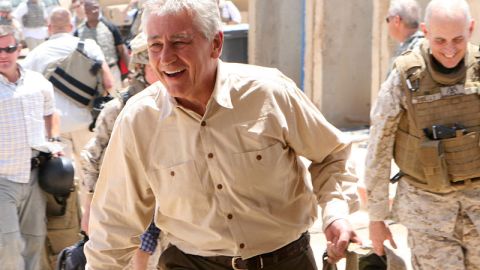Can Chuck Hagel Exorcize the Ghost of Neocons Past?

The debate over Chuck Hagel’s nomination for Secretary of Defense has centered around a number of his past positions that seem to have very little to do with the principal role he has been appointed to serve — overseeing the downsizing of the military industrial complex.
The position of Secretary of Defense was created after the Second World War to manage a colossus that by 2011 accounted for more government spending than Medicare, Medicaid and children’s health benefits combined. The position of Secretary of Cuts, as MSNBC’s Evan Puschak recently dubbed it, will require deft political skills and resource management savvy in order to change the system from within. In the case of an outspoken dissenter like Hagel, this task will also require the settling of some old scores.
After influential neoconservatives like William Kristol touted Hagel as a possible running mate for George W. Bush in 2000, Hagel attracted neocon ire in 2006 when he became the chief Republican dissenter on Iraq. Here’s what Hagel said at the time:
When I think of issues like Iraq, of how we went into it — no planning, no preparation, no sense of consequences, of where we’re going, how we were going to get out, went in without enough men, no exit strategy, those kinds of things — I’ll speak out. I’ll go against my party.
Hagel was also going against neoconservatives like Kristol, who make up a Washington think tank establishment that might be described as the intellectual arm of the military industrial complex. And that is why Hagel’s nomination is shaping up as a replay of the Iraq War debate. Not only are the political wounds from the last decade still raw, Hagel also faces an entrenched culture at the Pentagon that is hostile to dissent.
As Peter Beinart argues in the Daily Beast:
What makes Hagel so important, and so threatening to the Republican foreign-policy elite, is that he is one of the few prominent Republican-aligned politicians and commentators (George Will and Francis Fukuyama are others, but such voices are rare) who was intellectually changed by Iraq. And Hagel was changed, in large measure, because he bore within him intellectual (and physical) scar tissue from Vietnam. As my former colleague John Judis captured brilliantly in a 2007 New Republicprofile, the Iraq War sparked something visceral in Hagel, as the former Vietnam rifleman realized that, once again, detached and self-interested elites were sending working-class kids like himself to die in a war they couldn’t honestly defend.
What’s the Big Idea?
The appointment of Hagel, who saw Iraq as “an absolute replay of Vietnam,” is about “accountability for the Iraq War, as Chuck Todd put it. So what should we reasonably expect Hagel to do as an ombudsman at the top? How might he apply the lessons learned from Iraq and change the culture of the Department of Defense?
Mistakes happen, says Tim Harford, aka “Britain’s answer to Malcolm Gladwell.” Harford argues that organizations need to create a culture where these mistakes are “revealed, exposed and corrected as soon as possible.” More on that in a moment.
As Peter Beinart pointed out above, we have a culture in Washington where very few people were changed intellectually by the Iraq War the way Hagel was. One notable exception is Francis Fukuyama, who told Big Think that when he broke with neoconservative orthodoxy on Iraq he needed to overcome the fear of social rejection and not being afraid to “piss people off.”
Watch the video here:




